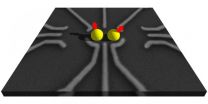(Press-News.org) Making a plan can be the difference in overcoming a difficult childhood, while just thinking about those difficulties can drag down the child.
A set of four new studies from researchers at USC and Southwest University in China suggest, contrary to prior belief, children in difficult situations need to do more than dream of a happier and successful future self: They need a strategy for becoming that person.
Two of the studies found eighth graders performed better in school if they had strategies for becoming their future selves, as well as several options for becoming the self that they envision. The other two studies showed that the mere thought of an unhappy childhood was enough to dampen the optimism and the ability of children to plan their escapes.
The set of studies were published online in the Journal Of Adolescence on Aug. 28.
'Left behind' children
The scientists had focused on a population with profound social and economic challenges: rural Chinese children labeled "left behind" and usually left in the care of grandparents because their parents have left them while seeking higher-paying urban jobs far from home.
These parents do not take their children with them because Chinese law requires that children attend school in the area where they were born, said Daphna Oyserman, Dean's Professor of Psychology and Co-director of the USC Dornsife Center for Mind and Society.
As a result, an estimated 40 percent of all Chinese children in rural areas - as many as 61 million - are left behind, according to the All-China Women's Federation.
"Their parents, like parents everywhere, sacrifice the present for hopes for the future. I started the studies wondering if calling a child 'left behind,' would have negative consequences with the implication that 'no one loves me," Oyserman said. "Or are the parents able to instill in their children this narrative?: 'We are doing this so our family can move forward.'
"That is what we found: Like their peers, 'left behind children' who focus on their possible future selves and especially on strategies to attain these possible future selves, fulfill their parents' 'moving forward' narrative," Oyserman said. "Their academic performance improves, they have fewer problems at school and feel better."
The narrative could apply to children anywhere, Oyserman noted. American children, for example, may face homelessness, separation from a parent through divorce, or endure the instability of foster care placement.
Oyserman and Southwest University professor Chongzeng Bi conducted four studies with four separate groups of children, all around 14 years old, ranging in number from 124 to 176 students, in the Chongqing region of China. Many of the teens reported that their parents had left them when they were young as 5 years old.
The researchers gauged the students' feelings about being left behind, their future and fatalism, and sought to determine what helps children rise above difficult circumstances.
'Pull yourself up'
Through a combination of experiments, final exam results and behavior reports, the researchers found:
Study 1: The thought of being "left behind" had a negative effect on the teens' optimism for the future, and it increased their fatalism.
Study 2: The thought of being "left behind" increased the teens' fatalism. Having feelings that their fate and future were not in their control dampened the number of images students had of their future selves, as well as the number of strategies they had to become their future selves, Oyserman said.
Study 3: Students with more images of their future possibilities scored higher on the exam. Researchers also found that left-behind students who had more future self images were more likely to have behavior problems in school - unless they had strategies for attainment, Oyserman said.
Study 4: Researchers found that left-behind students who had more strategies to attain their possible selves scored better on their exams a year later, controlling for their prior test score, and they were less likely to be depressed, Oyserman said.
Prior research has shown that left-behind children experience a higher rate of injury and illness compared to others, Oyserman said, while they face discrimination by teachers, their communities and the media.
"Part of why I wanted to look at this particular group is that China is an enormous piece of the world, both in terms of population and in terms of future trends, and Chinese parents, like any parents, are willing to sacrifice an awful lot in the hope that things will turn out better for their kids," Oyserman said.
"In our studies, even though children who are left by their parents are clearly emotionally stressed, they are not doing worse academically than the others in their classes," Oyserman said. "They seem to have gotten this message: 'Life is hard. Pull yourself up.'"
INFORMATION:
The School of Psychology at Southwest University funded the studies.
PITTSBURGH--How did the elephant get its trunk? Or the turtle its shell? How, in general, did the seemingly infinite diversity of complex animal forms on our planet arise? The scientific pursuit of how such "evolutionary novelties" come about is one of the big mysteries that biologists are trying to tease apart.
The University of Pittsburgh's Mark Rebeiz and colleagues provide some answers in a paper published today in the journal Developmental Cell.
Even in the most complex organisms, the genetic repertoire is limited. If creatures don't evolve by acquiring new genes, ...
DURHAM, N.C. -- Teenagers are irrational and make bad decisions. Or do they? A new Duke study finds that adolescents ages 10 to 16 can be more analytical in their economic choices than many slightly older young adults.
Published online in the October-December issue of Cognitive Development, the study suggests not only that society should give adolescents more credit for rationality but also that parents should help children hone their cost-benefit analysis skills in making real-life decisions.
"The new results point to the idea that we should not think of adolescents ...
ROCHESTER, Minn. -- Low-risk cancers that do not have any symptoms and presumably will not cause problems in the future are responsible for the rapid increase in the number of new cases of thyroid cancer diagnosed over the past decade, according to a Mayo Clinic study published in the journal Thyroid. According to the study authors, nearly one-third of these recent cases were diagnosed when clinicians used high-tech imaging even when no symptoms of thyroid disease were present.
"We are spotting more cancers, but they are cancers that are not likely to cause harm," says ...
This news release is available in French. Chemical substances that are safe for humans when taken in isolation can become harmful when they are combined. Three research teams bringing together researchers from Inserm and CNRS in Montpellier have elucidated in vitro a molecular mechanism that could contribute to the phenomenon known as the "cocktail effect." This study is published in the journal Nature Communications.
Every day we are exposed to many exogenous compounds such as environmental pollutants, drugs or substances in our diet. Some of these molecules, known ...
Got rope? Then try this experiment: Cross both ends, left over right, then bring the left end under and out, as if tying a pair of shoelaces. If you repeat this sequence, you get what's called a "granny" knot. If, instead, you cross both ends again, this time right over left, you've created a sturdier "reef" knot.
The configuration, or "topology," of a knot determines its stiffness. For example, a granny knot is much easier to undo, as its configuration of twists creates weaker forces within the knot, compared with a reef knot. For centuries, sailors have observed such ...
WORCESTER, MA -- Researchers at the University of Massachusetts Medical School are the first to show that it's possible to reverse the behavior of an animal by flipping a switch in neuronal communication. The research, published in PLOS Biology, provides a new approach for studying the neural circuits that govern behavior and has important implications for how scientists think about neural connectomes.
New technologies have fueled the quest to map all the neural connections in the brain to understand how these networks processes information and control behavior. The human ...
SALT LAKE CITY, Sept. 7, 2015 - If you are in a special relationship with another person, thank grandma - not just yours, but all grandmothers since humans evolved.
University of Utah anthropologist Kristen Hawkes is known for the "grandmother hypothesis," which credits prehistoric grandmothering for our long human lifespan. Now, Hawkes has used computer simulations to link grandmothering and longevity to a surplus of older fertile men and, in turn, to the male tendency to guard a female mate from the competition and form a "pair bond" with her instead of mating with ...
Physicists from the Department of Nanophotonics and Metamaterials at ITMO University have experimentally demonstrated the feasibility of designing an optical analog of a transistor based on a single silicon nanoparticle. Because transistors are some of the most fundamental components of computing circuits, the results of the study have crucial importance for the development of optical computers, where transistors must be very small and ultrafast at the same time. The study was published in the scientific journal Nano Letters.
The performance of modern computers, which ...
Developing transparent or semitransparent solar cells with high efficiency and low cost to replace the existing opaque and expensive silicon-based solar panels has become increasingly important due to the increasing demands of the building integrated photovoltaics (BIPVs) systems. The Department of Applied Physics of The Hong Kong Polytechnic University (PolyU) has successfully developed efficient and low-cost semitransparent perovskite solar cells with graphene electrodes. The power conversion efficiencies (PCEs) of this novel invention are around 12% when they are illuminated ...
Calculation with electron spins in a quantum computer assumes that the spin states last for a sufficient period of time. Physicists at the University of Basel and the Swiss Nanoscience Institute have now demonstrated that electron exchange in quantum dots fundamentally limits the stability of this information. Control of this exchange process paves the way for further progress in the coherence of the fragile quantum states. The report from the Basel-based researchers appears in the scientific journal Physical Review Letters.
The basic idea of a quantum computer is to ...


